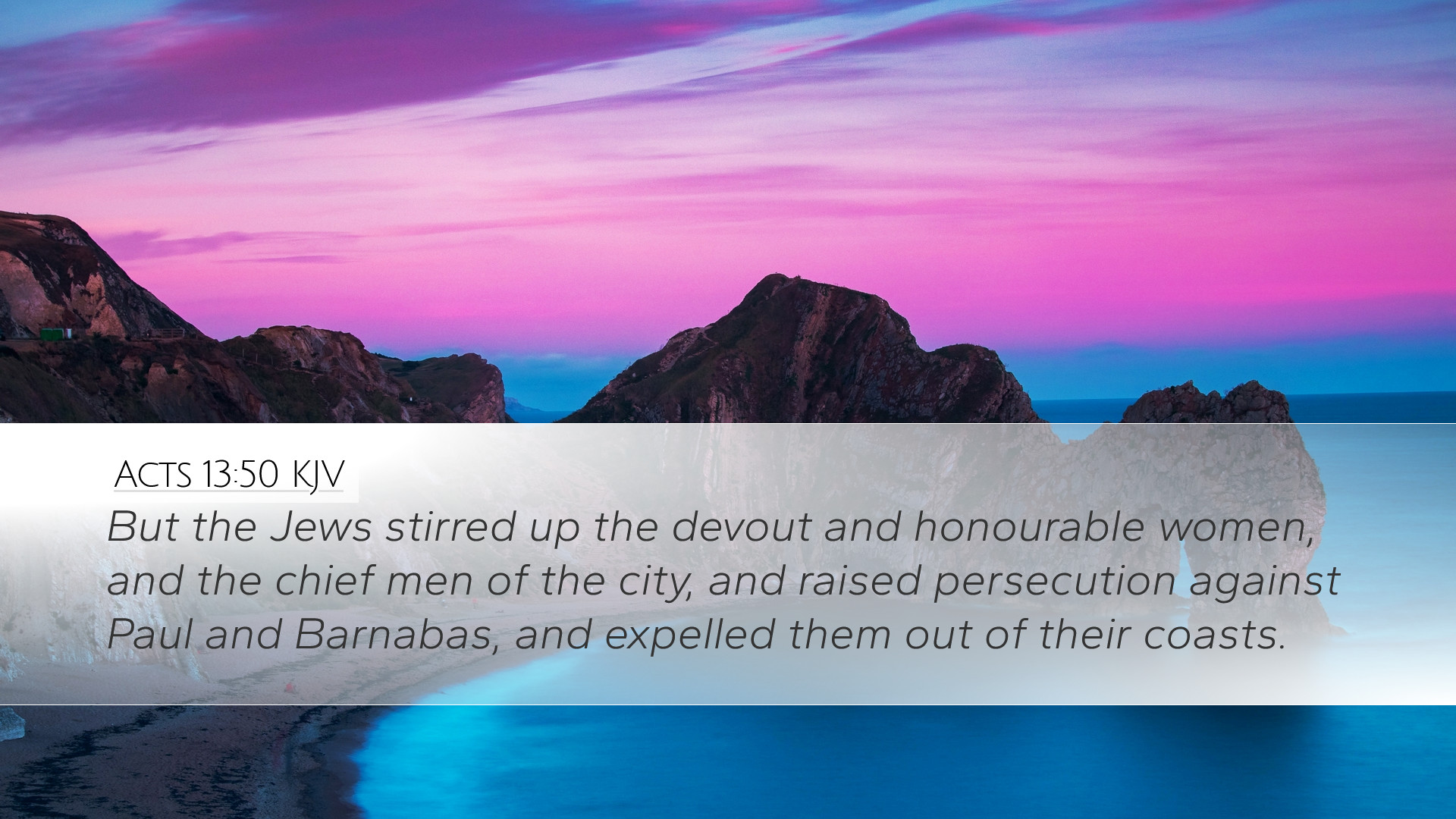Commentary on Acts 13:50
Acts 13:50 states:
"But the Jews stirred up the devout and honorable women, and the chief men of the city, and raised persecution against Paul and Barnabas, and expelled them out of their coasts."
Introduction
In this verse, we observe the continuing narrative of Paul and Barnabas' missionary journey. The response of the Jewish community to their preaching illustrates the challenges faced by early Christians. This commentary draws insights from various public domain commentaries, notably those by Matthew Henry, Albert Barnes, and Adam Clarke, to explore the theological implications and historical context of this verse.
Exegesis of Acts 13:50
The verse shows a crucial turning point in the apostles' ministry in Antioch. The Jews' reaction can be understood in several key aspects:
- Incitement of Opposition: The phrase "stirred up" indicates a deliberate effort to incite opposition against Paul and Barnabas. It highlights the organized nature of their resistance. As Matthew Henry notes, this act was not merely social but a concerted effort to protect their religious authority and reject the new teachings of the apostles.
- Influencing the Influential: The use of "devout and honorable women, and the chief men of the city" underscores the social dynamics at play. Albert Barnes emphasizes that the Jewish leaders knew how to leverage social structures to gain momentum for their cause, using those perceived as respectable to influence public opinion and instigate persecution.
- Expulsion as a Form of Persecution: The expulsion of Paul and Barnabas signifies a severe response from the Jewish leaders. This action mirrors the broader patterns of religious intolerance seen throughout the New Testament. Adam Clarke provides context on how such expulsions were not uncommon for missionaries, showcasing the risks involved in proclaiming the Gospel.
Theological Insights
This verse raises several theological themes pertinent to the understanding of early Christian persecution and the dynamics of faith:
- The Nature of Persecution: The hostility faced by Paul and Barnabas exemplifies the often tumultuous relationship between the church and prevailing religious authorities. The persecution they endured is indicative of the believer's journey, aligning with Christ's teachings about suffering for righteousness' sake.
- Response to the Gospel: The diverse receptions to the Gospel message—acceptance by some and vehement opposition by others—highlight the divisive nature of truth. Matthew Henry remarks on the sorrowful reality that the more profound the truth, the more varied the responses it elicits.
- The Role of Women in Early Christianity: Interestingly, the mention of "devout and honorable women" raises a critical point regarding women's roles in the early church. Their involvement in both belief and opposition indicates a significant presence that should not be overlooked in contemporary discussions on ecclesiology and gender roles in ministry.
Historical Context
Understanding the historical context is key to interpreting this verse:
- Jewish Authority: The actions of the Jewish leaders demonstrate the high stakes involved in the early Christian movement. The fear of losing their status and influence likely fueled their aggressive response. Adam Clarke elaborates that the early church often found itself at odds with established religious norms.
- Geographical Significance: Antioch was strategically important in the Roman Empire, serving as a crossroads of trade and culture. This significance meant that the spread of Christianity here could have further-reaching implications, potentially provoking even more substantial opposition due to the diverse population and religious plurality.
The Persistence of the Apostles
Despite their expulsion, Paul and Barnabas' tenacity is instructive for modern-day believers. They did not let opposition hinder their mission; instead, they continued to spread the Gospel wherever they went:
- Lessons on Resilience: The perseverance of the apostles in the face of persecution serves as a profound example for contemporary believers grappling with opposition. They teach us about the need for resilience and unwavering commitment to the mission of Christ.
- Evangelism Amidst Adversity: The confrontation between Paul, Barnabas, and the Jewish leaders illustrates that evangelism can thrive even amid adversity. Albert Barnes emphasizes that the apostolic mission is not limited by the hostility one faces but is often fueled by it.
Conclusion
Acts 13:50 is not merely a historical account; it offers rich insights into the early church's struggles and triumphs. The coordinated efforts of the Jewish leaders to suppress the apostles underscore the complexities of religious authority, while the steadfastness of Paul and Barnabas serves as a reminder of God's call to proclaim His truth despite opposition. As we reflect on this passage, may we draw courage and inspiration from the example of the apostles, striving to be faithful in the face of challenges in our own contexts.


